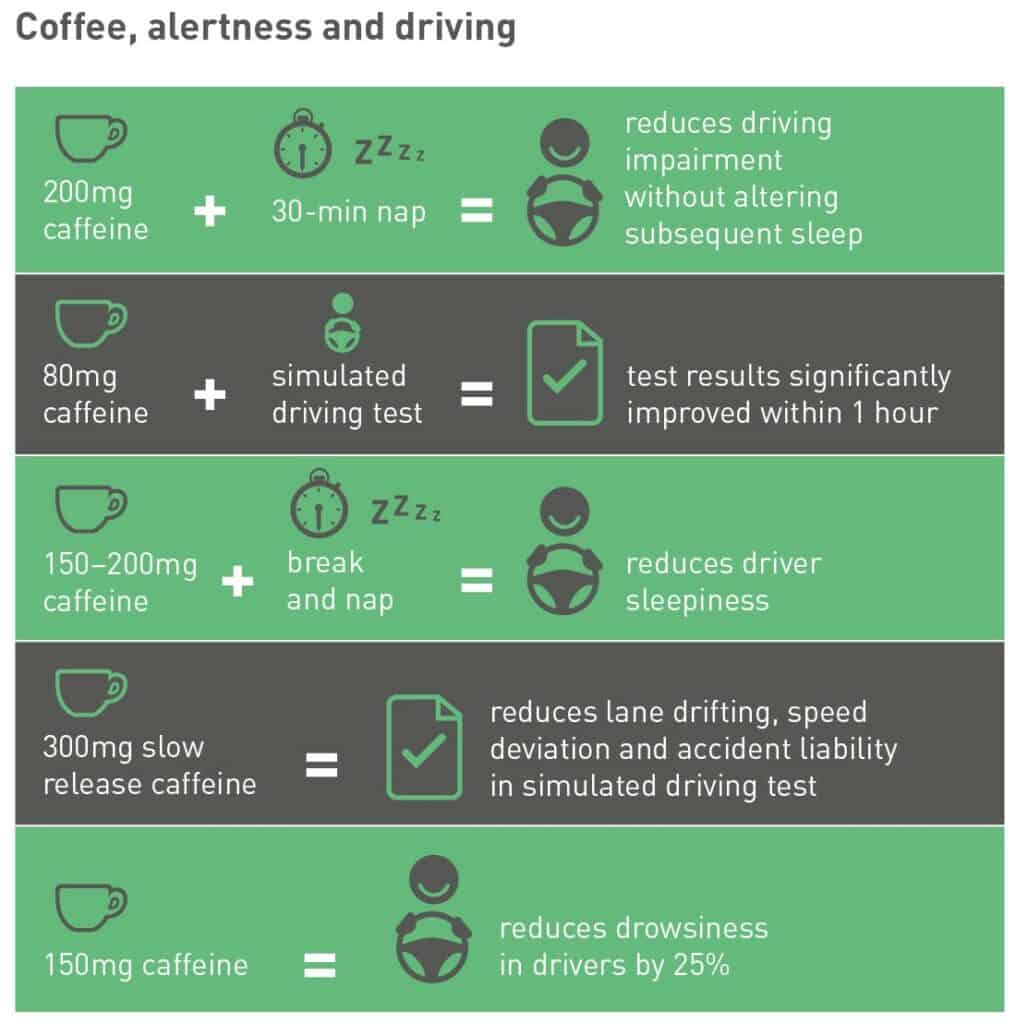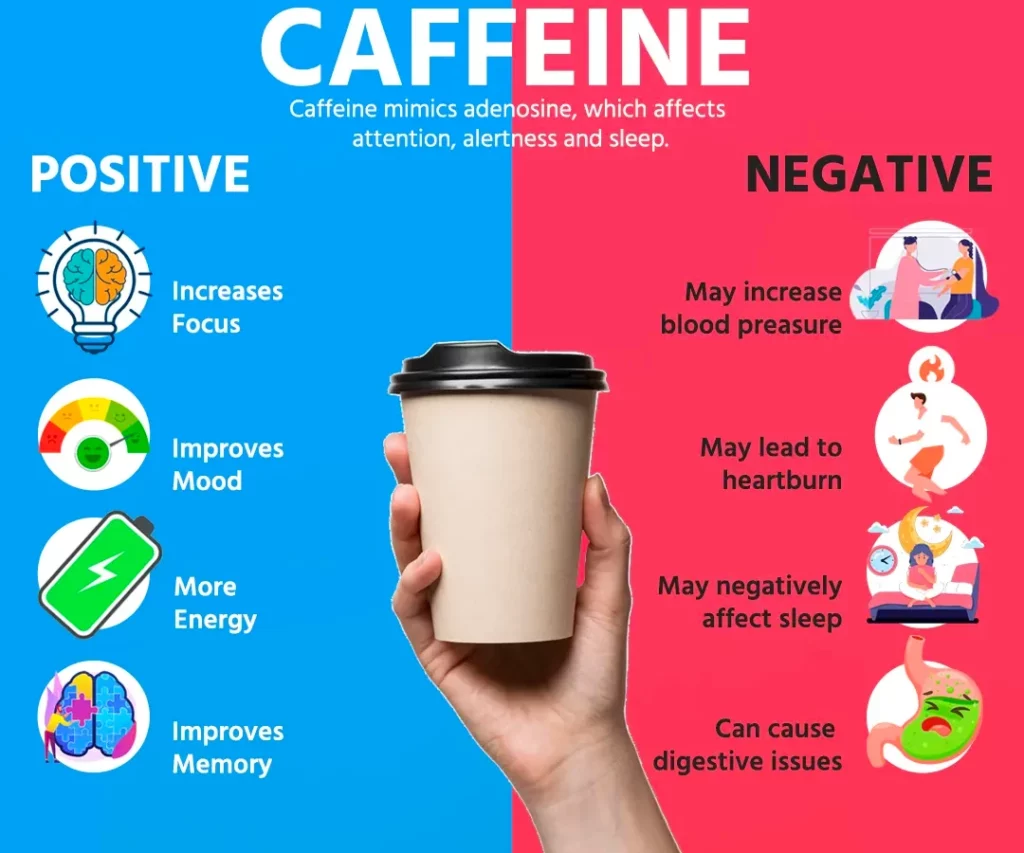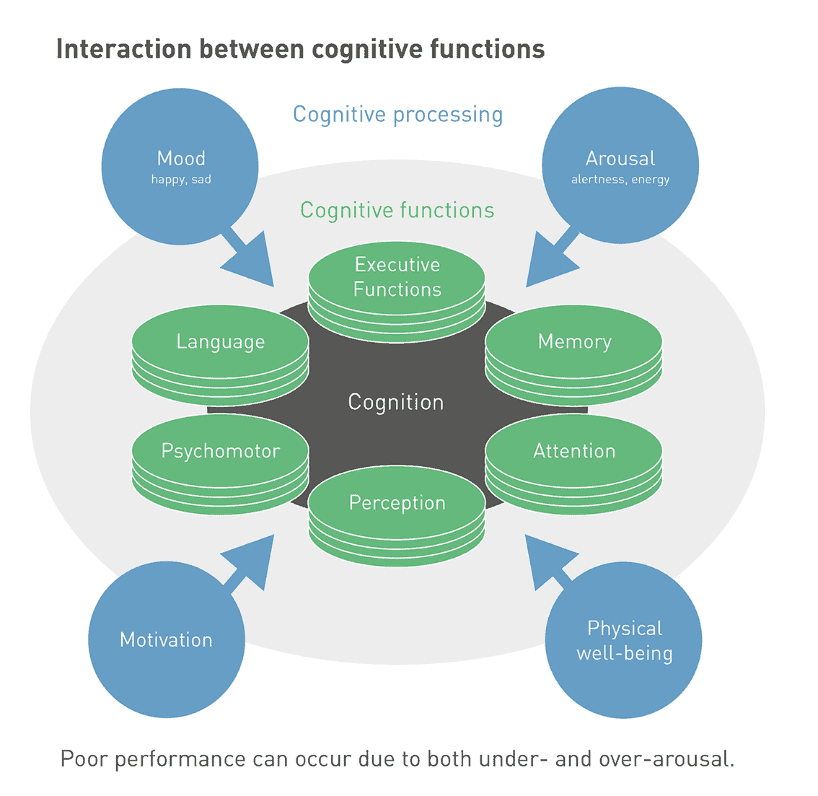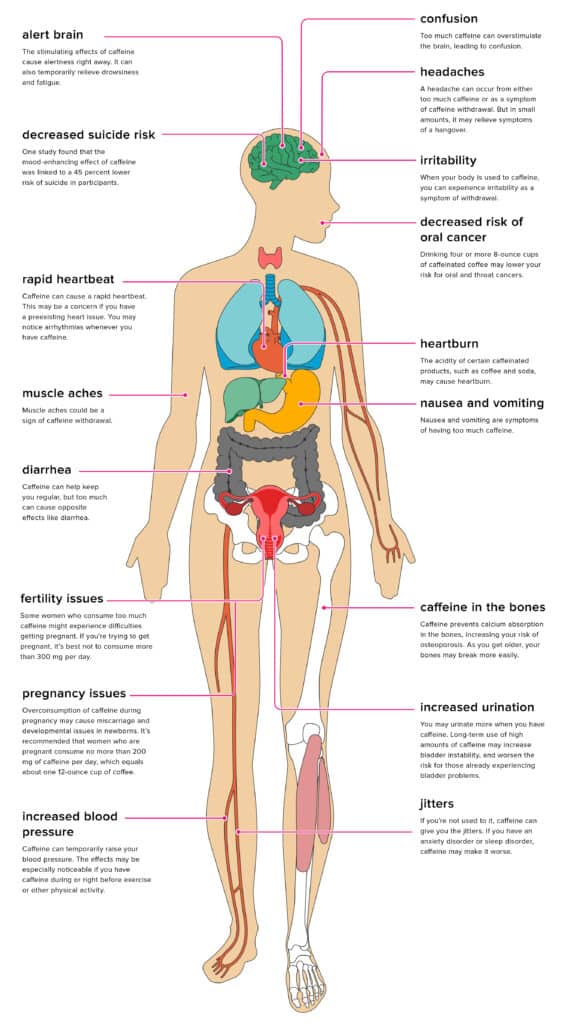Caffeine is a naturally occurring stimulant found in coffee and many other beverages and foods. It belongs to a class of compounds called xanthines, which act as central nervous system stimulants. When consumed, caffeine quickly enters the bloodstream and reaches the brain, where it exerts its effects on various neurotransmitters and receptors. It is the most widely consumed psychoactive substance in the world, primarily sought after for its stimulant properties.
How Caffeine Affects The Human Brain
Caffeine affects the human brain by blocking the action of adenosine, a neurotransmitter that promotes sleep and relaxation. By blocking adenosine receptors, caffeine increases alertness and inhibits drowsiness.
Additionally, caffeine stimulates the release of other neurotransmitters such as dopamine, which contributes to its mood-enhancing effects. The overall result is increased wakefulness, improved cognitive function, and enhanced focus and attention.
Quantity of Caffeine in a Cup of Coffee
The amount of caffeine in a cup of coffee can vary widely depending on factors such as the brewing method, coffee bean type, and serving size. On average, an 8-ounce cup of brewed coffee contains approximately 95 milligrams of caffeine.
However, this amount can range from as low as 30 milligrams in a small cup of decaffeinated coffee to as high as 200 milligrams or more in a strong espresso. It is essential to be aware of the caffeine content of your coffee to manage your consumption effectively and avoid potential negative effects.
How Coffee Drives Alertness and Focus
Caffeine as a Stimulant
Caffeine acts as a stimulant by antagonizing adenosine receptors in the brain. Adenosine promotes sleep and relaxation by inhibiting the release of exciting neurotransmitters. When caffeine blocks adenosine, the brain’s excitatory pathways become more active, resulting in increased wakefulness and alertness. Studies have shown that caffeine can improve reaction time, vigilance, and overall cognitive performance.
How Caffeine Increases Alertness
Caffeine increases alertness primarily by stimulating the release of adrenaline, a hormone and neurotransmitter that promotes wakefulness and readiness for action. Adrenaline triggers the body’s ‘fight-or-flight’ response, leading to increased heart rate, elevated blood pressure, and heightened mental alertness. This physiological response helps individuals feel more awake, energized, and focused.
Effects of Coffee on Concentration and Attention
Coffee has been shown to have positive effects on concentration and attention. The stimulatory properties of caffeine can enhance cognitive function, improve mental clarity, and increase the ability to sustain attention over extended periods.
Research suggests that moderate coffee consumption can promote better performance in tasks requiring focused attention, memory retention, and information processing. However, it is important to note that individual responses to caffeine can vary, and excessive consumption or sensitivity to the substance may result in restlessness or jitteriness, which can be counterproductive to concentration.
The Timeframe of Caffeine’s Effects
The Onset of Caffeine’s Effect
After consuming coffee, the effects of caffeine typically begin to emerge within 15 to 45 minutes, depending on factors such as your individual metabolism and the presence of food in the stomach. As caffeine is absorbed into the bloodstream, it travels to the brain, reaching peak levels of concentration. This rapid onset is one of the reasons why coffee is a popular choice for a quick energy boost or increased alertness.
The Duration of Caffeine’s Effect
The duration of caffeine’s effects can vary from person to person, but on average, the effects of caffeine in a cup of coffee can last anywhere from 3 to 5 hours. After reaching peak levels, caffeine is metabolized by the liver, and its effects gradually diminish. It is important to note that individual factors such as age, weight, and tolerance can influence how long the effects of caffeine last in an individual.
Coming Down from a Coffee High
As the effects of caffeine wear off, individuals may experience what is commonly known as a ‘coffee crash.’ This refers to a sudden drop in energy and alertness as the stimulant properties of caffeine dissipate. The severity of the coffee crash can vary depending on the amount of caffeine consumed and an individual’s sensitivity. To avoid abrupt energy crashes, it is advisable to gradually decrease caffeine intake or opt for alternatives that provide sustained energy, such as balanced meals, regular exercise, and adequate sleep.
Potential Negative Effects of Coffee
Effects of Caffeine on Heart Rate and Blood Pressure
While caffeine can provide temporary increases in heart rate and blood pressure due to its stimulant properties, these effects are generally temporary and not concerning for healthy individuals. However, excessive caffeine consumption or preexisting cardiovascular conditions may increase the risk of experiencing adverse heart-related effects. It is advisable for individuals with heart conditions or hypertension to consult with their healthcare provider regarding their caffeine intake.
Impact of Caffeine on Cortisol Levels and Stress
Caffeine consumption has been shown to increase cortisol levels, a hormone known as the body’s primary stress hormone. Elevated cortisol levels can contribute to feelings of anxiety, restlessness, and sleep disturbances. However, it is important to note that individual responses to caffeine can vary, and not everyone experiences significant increases in cortisol levels. It is advisable for individuals who are sensitive to caffeine or experience symptoms of stress to monitor their caffeine intake and consider alternative sources of energy and focus.
Coffee and Its Potential Effects on the Thyroid Gland
There is ongoing research investigating the potential effects of coffee on the thyroid gland. Some studies have suggested that coffee consumption may interfere with thyroid function and may affect the absorption of synthetic thyroid hormone medication in individuals with thyroid conditions.
However, more research is needed to fully understand the relationship between coffee and thyroid health. Individuals with thyroid conditions should consult with their healthcare provider for personalized guidance regarding coffee consumption.
Coffee and Headaches
Why Coffee May Relieve or Trigger Headaches
Coffee is a complex beverage that contains various compounds that may influence headache occurrence and severity. While caffeine can have a vasoconstrictive effect, potentially relieving headaches, it can also have rebound effects or trigger headaches in susceptible individuals.
Additionally, other compounds present in coffee, such as tannins and acids, may contribute to headache triggers. Understanding one’s individual sensitivities and patterns is crucial in managing headaches and determining the appropriate role of coffee in one’s lifestyle.
People More Likely to Experience Coffee-Related Headaches
Individuals who are prone to migraines or tension headaches may be more susceptible to coffee-related headaches. Additionally, those who consume excessive amounts of caffeine or abruptly withdraw from regular caffeine intake may experience withdrawal headaches.
It is important for individuals who experience frequent headaches, particularly related to coffee consumption, to consult with a healthcare provider for accurate diagnosis, personalized guidance, and potential lifestyle modifications.
Specific Populations and Coffee Consumption
Coffee Concerns for Pregnant Women
Pregnant women often have concerns about the effects of caffeine on their developing fetus. While moderate caffeine consumption is generally considered safe during pregnancy, excessive intake may increase the risk of miscarriage or preterm birth.
Additionally, caffeine can cross the placenta and affect the baby’s developing nervous system. It is advisable for pregnant women to consult with their healthcare provider to determine an appropriate caffeine intake level that considers their individual circumstances.
Coffee Consumption for People with Anxiety and Heart Problems
Individuals with anxiety disorders or preexisting heart problems may be more sensitive to the stimulant effects of caffeine. Higher doses of caffeine may exacerbate anxiety symptoms, increase heart rate, and contribute to a sense of restlessness or jitteriness. It is essential for individuals with these conditions to monitor their caffeine intake and consider alternative beverages with lower caffeine content or caffeine-free options.
Understanding the Need for Different Individuals to Balance Coffee Intake
Every individual has unique metabolic and physiological characteristics, along with different tolerances and sensitivities to caffeine. Some individuals may need more caffeine to experience alertness and focus, while others may be highly sensitive and require lower doses. It is important for individuals to listen to their bodies, be mindful of their caffeine consumption, and find the balance that best suits their needs and promotes overall well-being.
The Role of Moderation and Listening to Your Body in Coffee Consumption
Why Moderation is Key
Moderation is key when it comes to coffee consumption to ensure that the benefits of caffeine are maximized while minimizing potential negative effects. Moderation helps maintain tolerance levels, reduce the risk of habituation and dependence, and allows individuals to make informed choices about their caffeine intake. It also enables individuals to assess their responses to coffee and adjust consumption based on their individual needs and preferences.
How to Determine Your Body’s Needs Regarding Coffee
Determining your body’s needs regarding coffee involves self-awareness and observation. Pay attention to how you feel after consuming coffee, including factors such as energy levels, focus, sleep quality, and any adverse effects. Consider keeping a caffeine journal to track your coffee intake and associated effects. Consult with healthcare professionals if you have concerns or need guidance on determining the appropriate level of coffee consumption for your unique circumstances.
Adverse Effects from Overconsumption of Coffee
Overconsumption of coffee can lead to adverse effects such as nervousness, insomnia, digestive issues, and increased heart rate. It may also potentiate anxiety symptoms and contribute to caffeine dependence or addiction. It is important to be mindful of your overall caffeine intake from all sources, including coffee and other beverages or foods, to avoid excessive consumption and its potential short-term and long-term consequences.
Proper Coffee Consumption Guidelines
The Recommended Daily Limit for Caffeine Intake
The general guideline for healthy adults is to consume no more than 400 milligrams of caffeine per day, which is roughly equivalent to four cups of coffee. This recommendation allows individuals to enjoy the benefits of caffeine while minimizing the risk of adverse effects. It is important to note that individual sensitivities, medical conditions, and certain medications may warrant lower caffeine intake levels. Consult with healthcare professionals to determine the appropriate daily limit for your specific circumstances.
How to Measure Your Coffee Intake
Measuring coffee intake involves knowing the caffeine content of your preferred brewing method and the specific coffee brand or bean you are using. Understanding the amount of caffeine in a serving size allows you to track and manage your overall consumption accurately. Consult reputable sources or look for packaging labels for information on caffeine content. Additionally, household measuring tools or coffee scoops can ensure consistent serving sizes, contributing to more precise measurement.
Adjusting Coffee Consumption Based on Individual Metabolism
Individual metabolism plays a significant role in how caffeine is processed and eliminated from the body. Factors such as age, weight, liver function, and genetic variations can influence an individual’s ability to metabolize caffeine efficiently.
One person may experience lingering effects from a cup of coffee, while another metabolizes caffeine rapidly. Pay attention to your body’s response to coffee and adjust consumption accordingly to align with your metabolism and maintain a healthy balance.
Health-Related Reasons to Limit or Avoid Coffee Consumption
Why Coffee Might Be Harmful for People with Cortisol or Fatigue-Related Issues
Coffee can have a stimulating effect on cortisol levels, which may be problematic for individuals experiencing cortisol dysregulation or chronic fatigue. Individuals with conditions such as adrenal fatigue or those struggling with HPA axis dysfunction may find that coffee exacerbates their symptoms. Reducing or avoiding coffee altogether may help support the body’s natural cortisol regulation and energy restoration processes.
The Impact of Coffee on Active Ulcers and Uncontrolled Conditions
Coffee and other caffeinated beverages have been associated with increased acidity in the stomach and, in some cases, irritation or exacerbation of conditions such as gastric ulcers or gastroesophageal reflux disease (GERD). For individuals with active ulcers or uncontrolled gastrointestinal conditions, it may be advisable to limit or avoid coffee consumption to minimize discomfort and promote digestive health.
Why Those with Hypertension Should Avoid Coffee
Coffee’s transient effects on blood pressure may be of concern for individuals with hypertension or uncontrolled high blood pressure. While the impact on blood pressure differs among individuals, it may be advisable for those with hypertension or heart conditions to limit or avoid coffee consumption to promote optimal cardiovascular health. It is important to consult with healthcare professionals for personalized guidance regarding caffeine intake and its potential effects on blood pressure.
Keep Enjoying Your Morning Brew
Coffee and its primary active compound, caffeine, play a multifaceted role in our daily lives. As the world’s most widely consumed psychoactive substance, caffeine’s effects on the human brain and body are both invigorating and complex. From enhancing alertness and cognitive function to potentially triggering headaches or affecting heart rate, the impact of caffeine is as varied as the individuals who consume it.
Understanding the nuances of caffeine’s effects, being mindful of individual sensitivities, and adhering to proper consumption guidelines are essential for maximizing the benefits while minimizing potential risks. Whether it’s the morning cup that jumpstarts the day or a carefully measured intake to support focus, coffee’s role in our lives is undeniably significant.
Just remember to consume in moderation. Happy brewing.

Coffee expert and industry insider, I’ve dedicated years to mastering the art and science of coffee making. From scrutinizing particle fineness to evaluating burr shapes, I delve into the minutiae that elevate coffee from good to exceptional. Whether it’s a complex pour-over or a robust espresso, my insights cater to those who don’t just drink coffee, but experience it.






